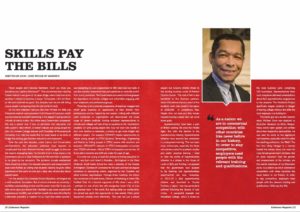
“Skills Pay The Bills,” written by Lord John Taylor of Warwick.
“Black people don’t become Barristers. Don’t you think you should set your sights a little lower?” That was the less than inspiring Careers Advice I was given at 16 years of age, when I told one of my teachers I wished to become a lawyer. Fortunately, I did not listen to him and achieved my goals. But decades later we are still failing young people in preparing them for the world of work.
On 10 April, Matthew Hancock, the then Minister for Skills and Enterprise made an announcement in the House of Commons which was monumental and earth shattering, in the degree it was ignored by virtually all media outlets. But unlike many Government statements, this was a pivotal one. It was an admission that education and skills systems need reform, to better prepare our young people for jobs. As a former College lecturer and Chancellor of Bournemouth University, I am only too aware that far more needs to be done to bridge the existing gap between education and employers.
To view, “Skills Pay the Bills” in Endeavour Magazine click here.
